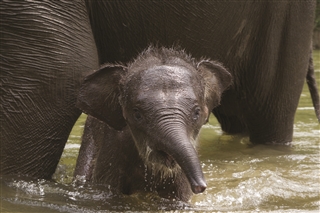Palm Oil News

ABOUT
The oil palm tree (Elaeis guineensis) comes from Africa but as it grows well in a tropical climate, where there is plenty of heat and rainfall, it is now also farmed in South and North America and Southeast Asia, mainly Malaysia and Indonesia. Compared to other oil crops in the same sized area, oil palms produce the most and it is the cheapest vegetable oil to refine. Tens of millions of tons of palm oil is produced every year and it can be found in many products that we use and eat every day. One company is even going to make cheap palm-oil diesel. This growing business comes at a high cost with three main problems:
DEFORESTATION
To make space for oil palm plantations (a large area of one type of plant), tropical forests and peatlands are cleared. Firstly, most of the valuable trees are removed and then anything left behind is burned. This releases a lot of greenhouse gas, carbon dioxide (CO2) and methane (CH4), which contributes to climate change. Recent estimates suggest that 98% of the forest in Indonesia may be destroyed by 2022, the lowland forest much sooner.
BIODIVERSITY LOSS
Most forest animals cannot survive in a plantation (they don’t have their usual food or places to rest). If they do go into a farmed area, they are seen as a pest and killed. A third of all mammal species in Indonesia are considered to be critically endangered. Some of the animals most at risk are orangutans, tigers, rhinoceros and elephants, as they all need large areas of natural forest to find food. An estimated 1,000-5,000 orangutans are killed each year. According to the United Nations (UN), there is a risk that no wild orangutans will remain outside of protected areas by 2020. As over 90% of orangutan habitat has been destroyed in the last 20 years, it is considered “a conservation emergency” by the UN. The orangutan is a keystone species (essential for the survival of other plants and animals). One of the important things that they do is spread rainforest seeds, many of which can only begin to grow once they’ve been eaten by an orangutan. The ‘development’ of an area to farm oil palm trees makes it easier for poachers and wildlife smugglers to capture and sell wildlife as pets, for medicinal purposes or kill them for their body parts. Mother orangutans are also often killed by poachers and have their babies taken to be sold or kept as pets, or used for entertainment in wildlife tourism parks in countries such as Thailand and Bali.
HUMAN SUFFERING
When the forests and peatlands are burning, they create a haze that makes humans unwell. Some palm oil companies use forced and child labour after taking land from local people, who are no longer allowed to live there. Native people rely on the forest for water, food and protection against landslides and floods. Additionally, the chemicals used on oil palm plantations pollute the soil and water, making it difficult for them to grow other crops.
Palm oil isn’t even a good thing to eat as almost half of it consists of saturated fats, which are known to cause health problems.
